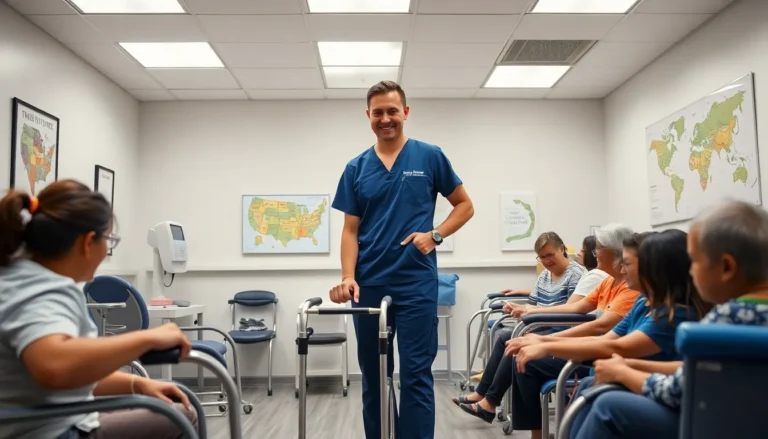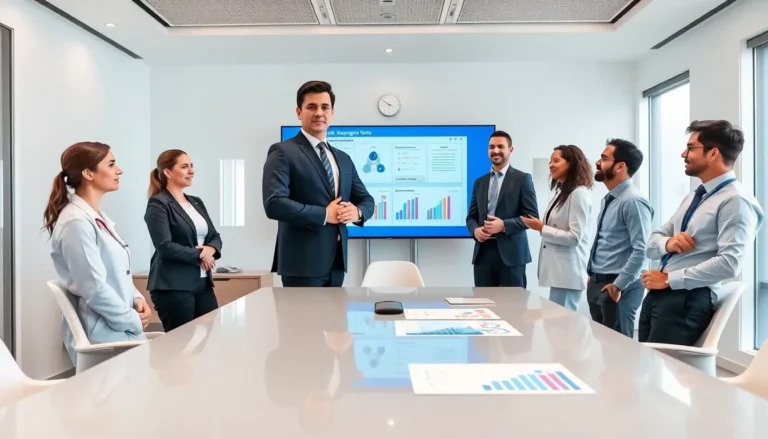Table of Contents
ToggleAdventure travel isn’t just a vacation; it’s a thrilling escapade that gets the adrenaline pumping and the spirit soaring. Whether it’s scaling mountains, diving into crystal-clear waters, or navigating through dense jungles, the world is packed with experiences waiting to be explored. But let’s face it—getting lost in the wilderness with nothing but a granola bar and a questionable map isn’t exactly the ideal adventure.
Understanding Adventure Travel
Adventure travel involves engaging in thrilling experiences that extend beyond the ordinary vacation. This form of travel combines excitement with unique challenges, appealing to those seeking more than just relaxation.
Definition of Adventure Travel
Adventure travel refers to journeys that emphasize exploration and physical activity. Engaging in activities like trekking, kayaking, or rock climbing defines this travel style. Participants often venture into remote locations, allowing them to experience nature’s beauty firsthand. These trips encourage personal growth and cultural immersion. Adventurers typically embrace spontaneity and adaptability, enhancing their travel experiences.
Types of Adventure Travel
Various types of adventure travel cater to different interests. Activities within these categories include:
- Extreme sports involve high-energy activities like paragliding, bungee jumping, and white-water rafting.
- Wildlife safaris offer opportunities to observe animals in their natural habitats while exploring diverse ecosystems.
- Cultural adventures focus on immersive experiences, such as participating in local traditions or volunteering within communities.
- Trekking or hiking enables exploration of trails in mountainous or remote areas, providing scenic views and physical challenges.
- Water activities include surfing, scuba diving, and snorkeling, allowing travelers to discover the underwater world.
Each type presents unique experiences that foster a deeper connection with the environment and local cultures.
Essential Adventure Travel Tips

Adventure travel requires thoughtful preparation and smart packing to ensure safety and enjoyment. Consider these key tips for a successful journey.
Planning Your Adventure
Choose a destination that matches your adventure level. Research the terrain, weather, and local regulations to avoid surprises. Create a flexible itinerary that accounts for unexpected changes. Establish a safe route and share it with someone not traveling with you. Prioritize booking guided tours for challenging activities. Check local health advisories and recommendations for vaccinations. Familiarize yourself with cultural norms and practices to enhance interactions with locals.
Packing Smart for Adventure
Pack essential gear that suits your selected activities. Include durable footwear for varied terrains and comfortable clothing suitable for changing weather. Don’t forget a reliable backpack for carrying supplies and water. Essential items include a first aid kit, a flashlight, and multi-tools. Opt for lightweight, quick-drying materials to minimize bulk. Consider packing a portable charger and a waterproof bag for valuables. Always carry snacks for energy during long excursions and a map or GPS for navigation. By preparing wisely, adventurers can focus on the thrill of the experience.
Safety Considerations
Safety remains a priority in adventure travel. Proper preparation ensures more enjoyable experiences while minimizing accidents.
Assessing Risks
Assess the environment before embarking on an adventure. Evaluate weather conditions, terrain challenges, and wildlife factors. Understand personal skill levels to avoid overextending capabilities. Prior experience in similar activities enhances assessment accuracy. Research local advisories and natural hazards, from landslides to flash floods. Taking these steps reduces risks and improves safety during exploration.
Emergency Preparedness
Establish a solid emergency preparedness plan for unexpected situations. Carry essential items like a first aid kit, fire-starting tools, and signaling devices. Familiarize yourself with local emergency services and procedures. Learning basic survival techniques, such as CPR and navigation skills, enhances overall safety. Share itineraries with trusted individuals, ensuring someone knows your plans. Practicing these strategies fosters confidence while adventuring.
Embracing Cultural Experiences
Adventure travel provides an excellent opportunity to immerse in local cultures. Engaging with locals fosters genuine connections and deeper understanding of customs and traditions.
Engaging with Locals
Interacting with residents enhances the travel experience. Seek opportunities to converse with shopkeepers, guides, or community members. Trying local cuisines or participating in traditional activities offers insights into daily life. Attending cultural events or festivals allows adventurers to witness local practices first-hand. Building relationships with locals creates memorable experiences and enriches travels.
Respecting Local Customs
Respecting local customs reflects an understanding of cultural sensitivities. Researching traditions before arrival helps avoid unintentional disrespect. Observing dress codes in sacred spaces shows reverence for local beliefs. Using simple phrases in the native language portrays willingness to engage. Participating in local rituals or practices deepens cultural appreciation. Each effort made to honor customs enhances the overall adventure experience.
Sustainable Adventure Travel
Sustainable adventure travel focuses on minimizing environmental impact while enhancing the experience. Attention to eco-friendly practices and supporting local economies plays a vital role in this approach.
Eco-Friendly Practices
Eco-friendly practices contribute significantly to sustainable adventure travel. Travelers should prioritize using reusable water bottles and bags to reduce plastic waste. Choosing eco-friendly accommodations that implement sustainable practices aids in ensuring a smaller carbon footprint. Participating in conservation activities helps preserve natural landscapes and wildlife during trips. When adventurers opt for low-impact transportation methods, such as biking or walking, they decrease pollution and enhance their experience of the environment.
Supporting Local Economies
Supporting local economies enhances the overall travel experience while benefiting communities. Dining at locally owned restaurants encourages the use of fresh, local ingredients, benefiting farmers and vendors. Purchasing souvenirs directly from artisans fosters economic growth and preserves cultural heritage. Engaging local guides enriches the adventure while ensuring that travelers receive authentic insights. Prioritizing local transport services instead of international companies helps retain funds within the community, ensuring a more positive impact on the region.
Adventure travel offers a unique blend of excitement and personal growth. By embracing the thrill of exploration and engaging with local cultures, travelers can create unforgettable memories. Prioritizing safety and preparation is essential for a successful journey.
Adventurers should not only focus on the activities but also on minimizing their environmental impact. Sustainable practices enhance the experience while benefiting the communities visited. With the right mindset and preparation, every adventure can lead to discoveries that inspire and transform.








